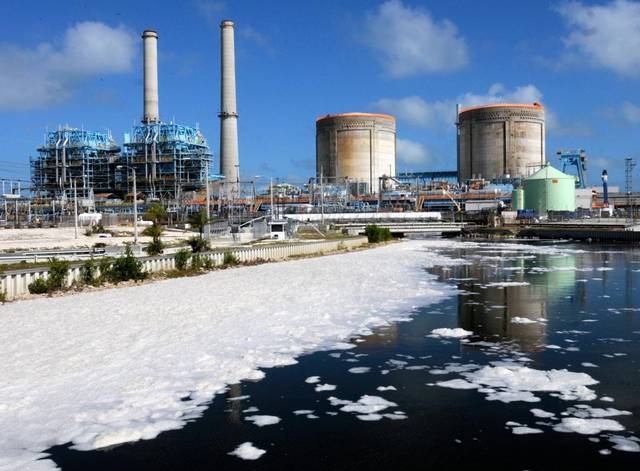Proposed cooling technologies can help stop contamination from polluting Biscayne National Park and South Florida’s drinking water.
The Southern Alliance for Clean Energy [SACE] released a new report last week by an expert with over thirty years of engineering experience that assesses the feasibility of using cooling towers as the solution to replacing the antiquated, leaking open industrial sewer called the cooling canal system at FPL’s Turkey Point power facility that has threatened South Florida’s drinking water and adjacent Biscayne National Park.
The report release comes on the heels of a citizen lawsuit filed by the Southern Alliance for Clean Energy [SACE] and Tropical Audubon Society [TAS], to be joined by Friends of the Everglades, against the utility under the Clean Water Act [CWA] after an extensive review of evidence documenting pollution discharges from the failed cooling canal system into Florida surface and ground waters.
FPL has repeatedly violated the Clean Water Act by operating what is essentially an open industrial sewer leading to historic and ongoing discharges to the surface and ground waters of Biscayne Bay, SACE also determined that DEP and FPL ‘proposed remedies’ are ineffective and will not protect public health alone, the environment and the outstanding waters of Biscayne National Park. SACE has taken the time and resources necessary to research what could be done to actually fix the problem.
The report finds that mechanical draft cooling towers can be constructed in a timely manner, has been done successfully at other power plants, including nuclear plants, and can be built affordably making this potential solution both feasible and cost-effective even if the cooling towers only operate for as few as ten years through the current 2032 and 2033 operating licenses.
“The use of mechanical draft closed-cycle cooling towers on Turkey Point Units 3 and 4, combined with the elimination of cooling tower wastewater discharges, represents the best available technology for eliminating the water quality and quantity problems being caused by the cooling canal system,” said Bill Powers of Powers Engineering, author of the new report. “The cooling towers can be operational in less than five years from the time FPL submits the application to build the towers. And the cost to install the cooling towers, even if they are only operated for 10-12 years, would have a minimal impact on FPL customer energy charges, in the range of 2 percent or less.”
The report mentions that these proposed cooling towers would work well within the power plant’s existing site plan and would neither compete with FPL’s proposed new reactors nor impact existing facilities on-site. Unit 5, which is a natural gas plant, already uses mechanical draft cooling towers.
Installation of the cooling towers would eliminate the need for FPL to pump 100 million gallons of fresh water daily from the L-31E canal, which was being tapped in order to lower the temperature of the water in the failing CCS. Miami-Dade County has already acknowledged that continued long-term use of the cooling canal system is untenable. A recent resolution was passed supporting the County Mayor in efforts to seek a commitment from FPL to discontinue use of the cooling canal system at the Turkey Point Power Plant.
Contaminated water leaking from FPL’s failing cooling canal system at Turkey Point is polluting the Biscayne Aquifer, a sole source aquifer that provides drinking water to more than three million people in the region. Despite claims by FPL and DEP There is also clear evidence of contamination of the surface waters of Biscayne National Park caused by discharges from the cooling canal system.
”The only way to ensure we eliminate the salt loading of three million pounds of salt daily and the perpetual demand on the region’s water supply is to abate the source of the pollution completely, that would require shutting down the cooling canal system once the plume has been cleaned up,” said Laura Reynolds, consultant for Southern Alliance for Clean Energy and former executive director of Tropical Audubon. “This solution not only removes all interaction with the Biscayne aquifer it provides a solution to the mandate Miami-Dade County is under to construct a reuse project to recycle 117.5 million gallons of water a day by 2025, this is a win-win for Miami-Dade county residents and an investment to protect Biscayne National Park we can all get behind.”







Comments are closed.